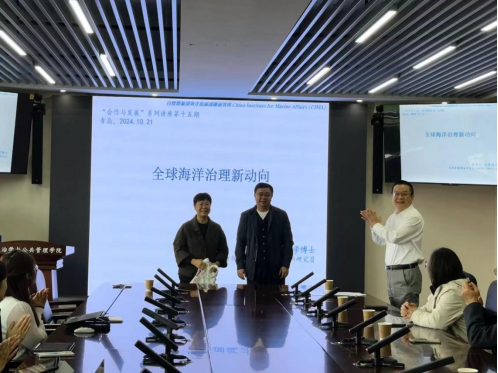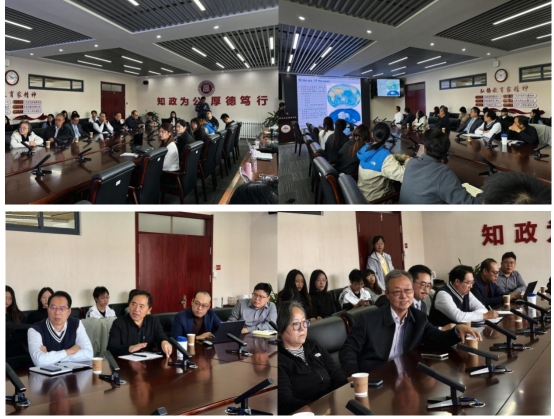On the morning of October 21,2024,the 17thlectureof the "Cooperation and Development"series,jointly organized by the School of Political Science and Public Administration at Shandong University, the Institute of SCO Studies of Shandong University, the Institute for Public Safety Research of Shandong University, and the China-SCO Institute of Economics and Trade,was successfully held in themeetingroom on the fourth floor of Huagangyuan South Building. The theme of this lecture is "New Trends in Global Ocean Governance," and Professor Zhang Haiwen, a senior researcher at the Marine Development Strategy Research Institute of the Ministry of Natural Resources and a member of the National Committee of the Chinese People's Political Consultative Conference has given the lecture. Thelecturewas chaired by Professor Edmund Li Sheng, Distinguished Professor at the School of Political Science and Public Administration and Executive Dean of the Institute of SCO Studies. Faculty and students from the School of Political Science and Public Administration, the Law School, and the Institute of Marine Science participated in the academic exchange.At the event, Professor Ma Ben, Dean of the School of Political Science and Public Administration, extended a warm welcome to Professor Zhang and presented her with a commemorative gift.

At the beginning of the lecture, Professor Zhang provided a detailed introduction to the evolving global ocean governance system, which has been continuously refined amid growing marine issues and increasing international attention to ocean governance. Drawing on data and case studies, he offered an in-depth analysis of current hot topics in global ocean governance and their impacts. He pointed out that once the BBNJ Agreement comes into effect, its marine protected area system will require coordination with existing frameworks, such as the freedom of the high seas under the United Nations Convention on the Law of the Sea, as well as the mandates and mechanisms of relevant institutions. Additionally, he noted that the formulation of regulations for deep-sea mineral resource exploitation and international negotiations on plastic pollution governance are still underway.Beyond these issues, Professor Zhang further explored emerging trends in global ocean governance, emphasizing the need for the international community to strengthen legal frameworks, advance marine technological innovation, and strike a balance between ocean resource exploitation and conservation.

During the interactive session, faculty and students engaged in lively discussions with Professor Zhang on topics such as the role of international actors in ocean governance, the geopolitical significance of the oceans, the formulation and enforcement of international law, and maritime issues in China’s neighboring regions. ProfessorEdmund Li Shengexpressed gratitude for Professor Zhang’s insightful presentation and highlighted the potential for cooperation on ocean-related issues among SCO and Belt and Road Initiative member states.
This lecture served as a valuable platform for deepening participants’ understanding of current challenges and future directions in global ocean governance. The School of Political Science and Public Administration at Shandong University remains committed to providing high-quality academic resources for its faculty and students, both domestically and internationally. We encourage continued attention to the school’s updates and the "Cooperation and Development" lecture series organized by the InstituteofSCOStudies.
